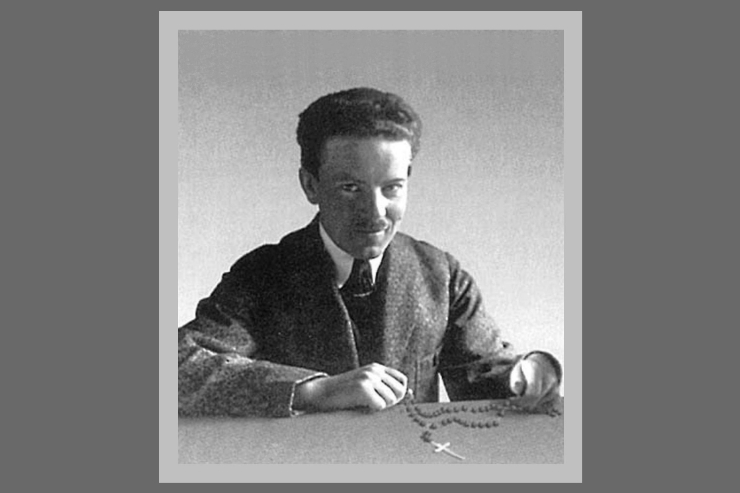Have you ever had a reaction like the one expressed in the title of this reflection? Have you even uttered these same words yourself?
Many of us know what it is like when our circumstances turn in a direction we did not expect. It may come in the form of a medical diagnosis or a financial setback. Maybe it comes from a broken relationship or some minor annoying burden that arrives at a time when we just can’t handle one more thing.
It is understood that unexpected bad news is not new. The Apostles experienced the same thing; Saint Peter even has something to say about it in his letters. Indeed, Peter’s First Letter is a mini theology on how to respond to life’s inevitable difficulties. And, like it or not, life’s trials happen to all of us, but we should not be taken back by these events.
Beloved, do not be surprised at the fiery ordeal which comes upon you to prove you, as though something strange were happening to you. (1 Peter 4:12)
Peter almost seems to be questioning how we, as Christians, could find ourselves surprised by the eccentricities of life. Afterall, he suggests, trials are nothing new or strange, they are indeed the stuff of life.
But one of the most difficult consequences of these trying times in our lives, is that they can cause us to wonder where God is, and why He is not doing something about our situation. These times can even lead us to question whether God is aware of what is happening to us.
Of course, the reality is that God is well aware of everything; He always knows about our lives long before we do, and He is always quite aware of what the final outcome of our circumstances will be.
Well then, we might ask, why does God not just respond to our prayers and make the bad circumstances go away.
In order to understand the answer to this question, we need to look again at the first part of the verse from Peter. Peter explains these ‘fiery ordeals,’ that we so often find ourselves caught up in, are a test from the Lord Himself. When these challenging times occur, we are being tested by the very circumstances we would like to see taken away. Now if that is true, we might ask, what is the test? Why are we being tested? And, more importantly, what is the correct response so we can just pass the test?
As for what the test is, it should come as no surprise: it is nothing less than a test of faith. In other words, we are being challenged on whether we really believe that God is with us, even in the midst of the fiery trials of life? Truthfully, these tough times are the only times we will be able to see just how strong our faith really is. If we have spent little time relying on God in our life, then we will certainly find it hard to turn to Him when things become difficult, and we may only do so out of desperation. On the other hand, if we have learned to rely on God consistently throughout our life, then we may turn to Him easily in difficult times.
But then, why do we have to be tested?
In this you rejoice, though now for a little while you may have to suffer various trials, so that the genuineness of your faith, more precious than gold which though perishable is tested by fire, may redound to praise and glory and honor at the revelation of Jesus Christ. (1 Peter 1:6-7)
The simple truth for many of us is that our faith is not yet perfect, and it does not yet offer true praise and glory in honor of Jesus Christ. We all carry little deformities, injuries, and hurts that lead us to doubt, at times, the omnipotence of God. It should not surprise us then, that in order to heal us of these defects, God must use the strong medicine of fiery trials. He places us in circumstances that force us to evaluate our own degree of trust in God. We must all come to that place where we will be forced to answer the question of whether we completely trust in God. Do we, or don’t we? (This question is the centerpiece of this reflection).
Now of course, we all want to do well when we are being tested, and we would like to be prepared before we are evaluated in any field of endeavor: so how do we prepare for this test? More directly, how do we increase our faith in God, and thereby gain confidence that He is intimately aware of, involved with, and working through every single aspect of our life? How do we do this? How do we pass this eternal test?
Trust in the Lord with all your heart, and do not rely on your own insight. In all your ways acknowledge him, and he will make straight your paths. (Proverbs 3:5-6)
The opening phrase of this verse does not tell us much. The answer to the question about how to trust in God cannot simply be saying to ourselves, “trust in God.” But that is not what this verse is saying. We must adopt the whole verse, especially the part that reads, “and do not rely on your own insight. In all your ways acknowledge him, and he will make straight your paths.”
The only way we can have faith in God, the only way we can hope to trust in God, especially in the most difficult moments in our lives, is to acknowledge Him, to allow Him to direct our ways, to allow Him to make straight our paths, and to rely solely, or soul-ly, on Him, in all the circumstances of our life, all the time. Put more succinctly, if you want to trust Him, ask God what He wants you to do and then do that. Do not rely on your own insight.
God does allow fiery trials to enter our lives, He absolutely does test us. But He does so only to draw us closer to Him, to teach us to rely on Him alone in all the circumstances of our lives.
This week let us all pray this simple prayer from the psalms. Let these words live in your heart.
Teach me thy way, O Lord, that I may walk in thy truth; unite my heart to fear thy name. (Psalm 86:11)
God Bless
Copyright © Mark Danis
Image credit: Photo by Nik Shuliahin 💛💙 on Unsplash














